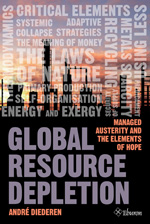I said all along that the idea that there were huge new oil fields in Alaska was both dangerous and wrong. Dangerous, because if there was oil there, drilling could destroy the ecosphere. Wrong, because like the North Sea, the oil companies always claim there is “oil next door” and then drill dry holes. I have often thought they use this technique to drain capital from smaller investors.
http://www.cnn.com/2010/US/10/27/alaska.oil.reserves/index.html
Alaska’s untapped oil reserves estimate lowered by about 90 percent
By the CNN Wire Staff
October 27, 2010 1:35 a.m. EDT
(CNN) — The U.S. Geological Survey says a revised estimate for the amount of conventional, undiscovered oil in the National Petroleum Reserve in Alaska is a fraction of a previous estimate.
The group estimates about 896 million barrels of such oil are in the reserve, about 90 percent less than a 2002 estimate of 10.6 billion barrels.
The new estimate is mainly due to the incorporation of new data from recent exploration drilling revealing gas occurrence rather than oil in much of the area, the geological survey said.
“These new findings underscore the challenge of predicting whether oil or gas will be found in frontier areas,” USGS Director Dr. Marcia McNutt said in a statement. “It is important to re-evaluate the petroleum potential of an area as new data becomes available.”
The organization also estimates 8 trillion cubic feet less gas than a 2002 estimate of 61 trillion cubic feet of undiscovered, conventional, non-associated gas — meaning gas found in discrete accumulations with little to no crude oil in the reservoir.
“Recent activity in the NPRA, including 3-D seismic surveys, federal lease sales administered by the Bureau of Land Management and drilling of more than 30 exploration wells in the area provides geological information that is more indicative of gas than oil,” the geological survey said.
:}
Of course the nutcases still believe this and will until their dieing days.
http://www.pushhamburger.com/hidden.htm

Huge Alaska Oil Reserves Go Unused
After 30 years, an insider finally acknowledges the United States
has all the oil and gas it needs.

By Marie Gunther
The United States has more oil reserves than Saudi Arabia but this happy though shocking information has been covered up for years.
The wells have been drilled, it’s merely a matter of turning on the faucets to supply America’s needs for 200 years.
These astounding revelations have been confirmed by a 30-year veteran oil exe cutive with leukemia who has decided to speak out.
In 1980, Lindsey Williams wrote a book, The Energy Non-Crisis, based upon his eye witness accounts during the construction of the Trans-Alaska pipeline. As a chaplain assigned to executive status and the advisory board of Atlantic Richfield & Co. (ARCO), he was privy to detailed information.
“All of our energy problems could have been solved in the ’70s with the huge discovery of oil under Gull Island, Prudhoe Bay, Alaska,” Williams said. “There is more pure grade oil there than in all of Sau di Arabia. Gull Island contains as much oil and natural gas as Americans could use in 200 years.”
Oddly though, immediately after this massive discovery, the federal government ordered the rigs to be capped and oil production shut down.
Developing Alaskan oil would make the United States completely independent of oil imports, Williams said in his book.
Why is the government covering up such good news? Why does it want to be dependent on imported oil? Do international financiers who are heavily invested in the oil industry want to keep the supply limited and prices up?
Will the Senate Energy and Natural Resources Committee, chaired by Sen. Frank Murkowski (R-Alaska), investigate what could be a criminal cover-up? Will the appropriate House committees in quire? Or the Justice Department? Since the cover-up has extended through four presidential administrations, only public outrage can force action.
“Everything you hear on the evening news and out of Washington is garbage,” said Jim Lawler, an oil production manager with ARCO. “Eight wells have already been drilled in the areas environmentalists are claiming we must not go in. We have already been in and out. There was no damage done. All we need to do is start production.”
:}
More tomorrow
:}
 The pipeline that’s going to carry carbon dioxide from one place to another as part of the FutureGen clean-coal project is the subject of a bill which has passed a Senate committee. The bill writes a process for Illinois to oversee the construction and operation of such a pipeline.
The pipeline that’s going to carry carbon dioxide from one place to another as part of the FutureGen clean-coal project is the subject of a bill which has passed a Senate committee. The bill writes a process for Illinois to oversee the construction and operation of such a pipeline.


